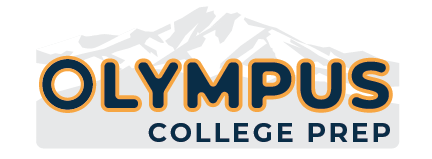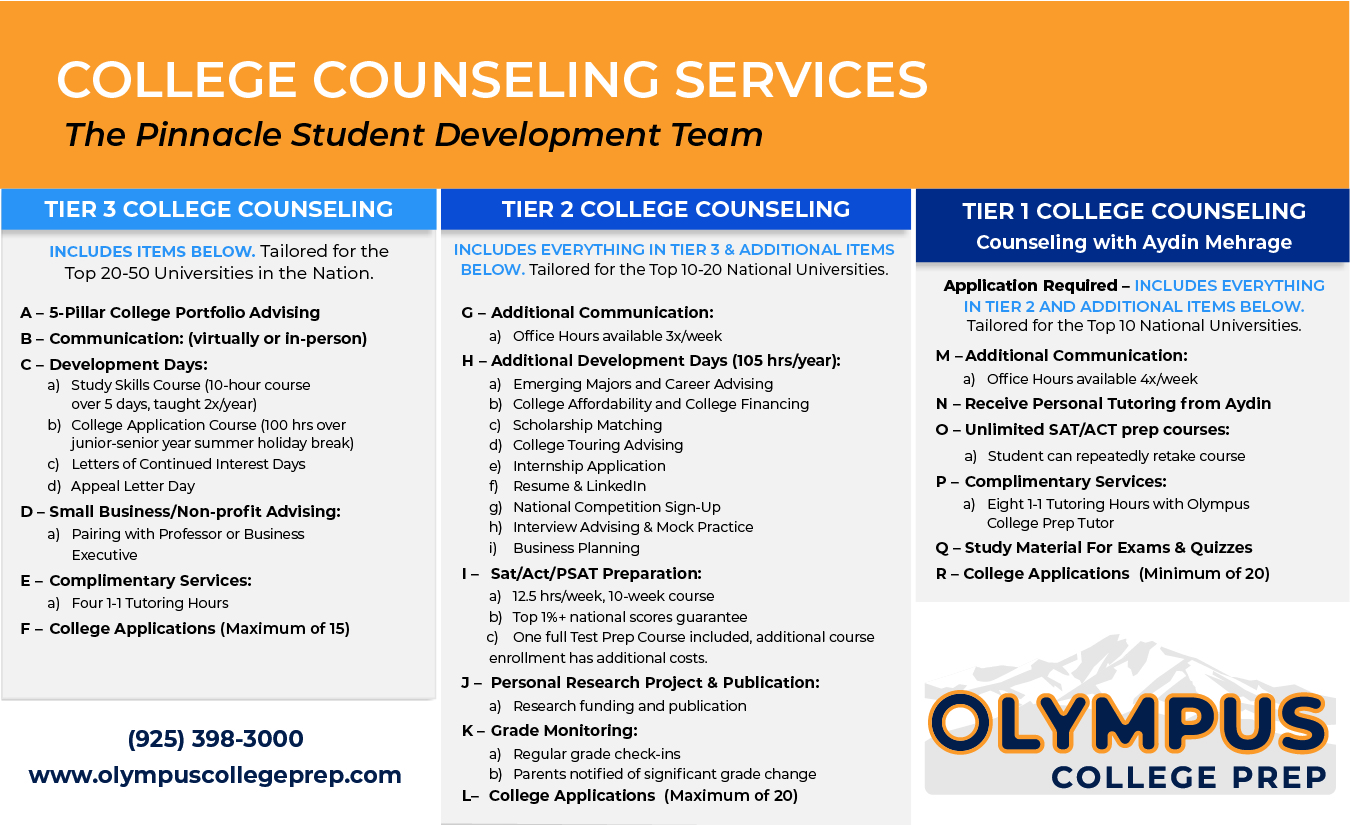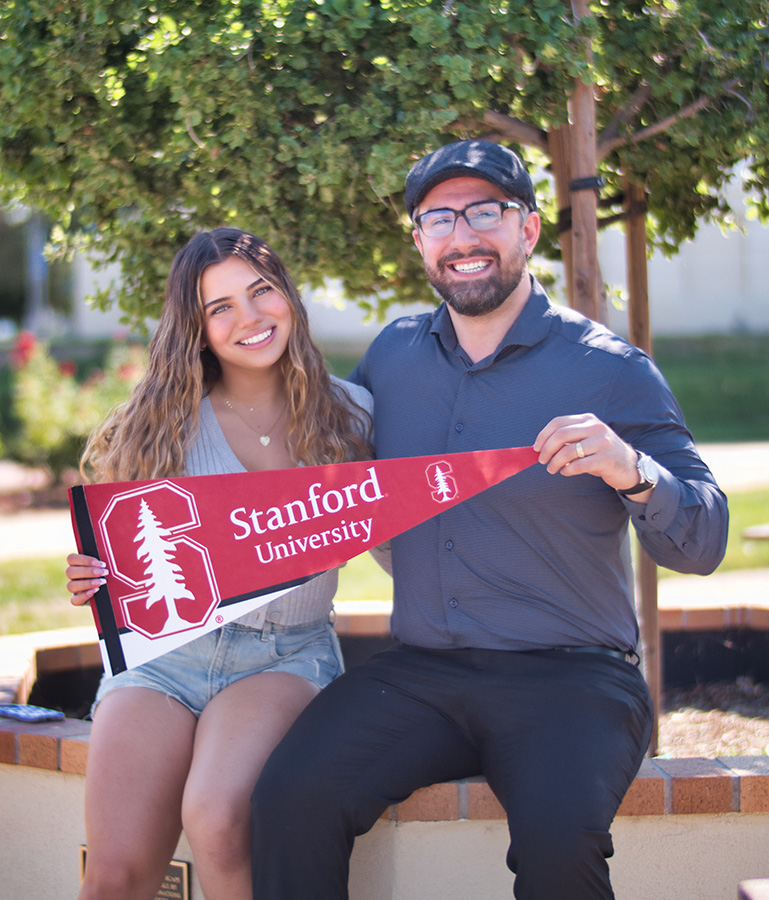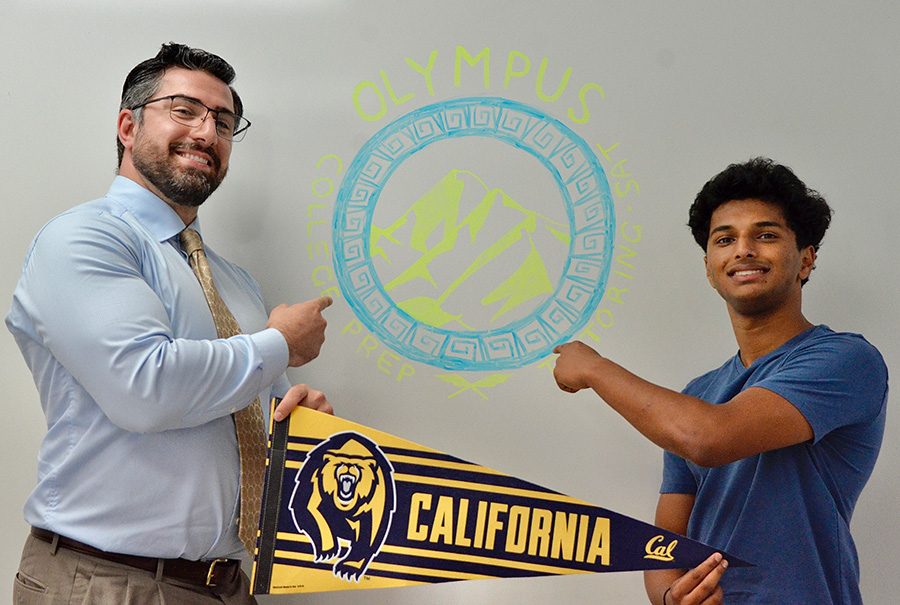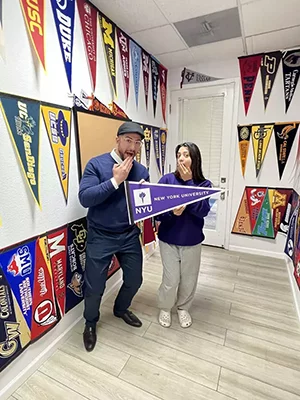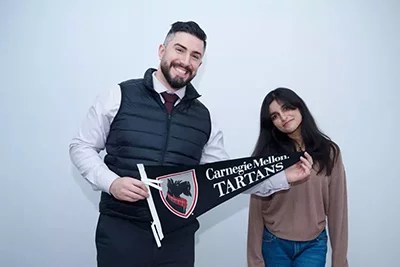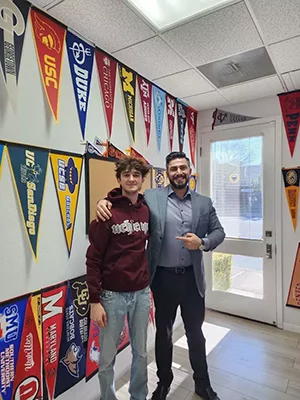
College Counseling
IMAGINE
Your child thriving at a top university, surrounded by brilliant minds and endless opportunities.
That’s the future Olympus College Prep helps create.

- Empowering Students, Shaping Leaders: At Olympus, we go beyond admissions. We use
our cutting-edge algorithm and 5 Pillar College Counseling system, guiding students to become industry leaders for their future careers. - Visualize Success: See where our graduates thrive!
- Free College Admissions Workshop: Get started with a complimentary information session (1 hour). Contact Us
- Expert Guidance: Our team boasts decades of experience on UC admissions boards. We ensure every activity-academics, clubs, competitions, sports, internships, community service-contributes to a winning college application.
WHAT SETS US APART?
- Long-Term Growth: We don’t just get you into college; we prepare you for success.
- Experience You Can Trust: We cut through the noise. We know which internships matter, which competitions stand out, and how to maximize volunteer experiences. Say goodbye to wasted effort!
- Stress-Free Admissions: College prep should be enriching, not overwhelming. We tailor activities to your child’s passions, fostering 100% effort and focus.
- Development Days: Over 100 hours of transformative classes! This includes:
- Top 1% SAT/ACT Prep (guaranteed!)
- School Exam Preparation
- Effective Study Skills
- Professional Career Advising
- …and more!
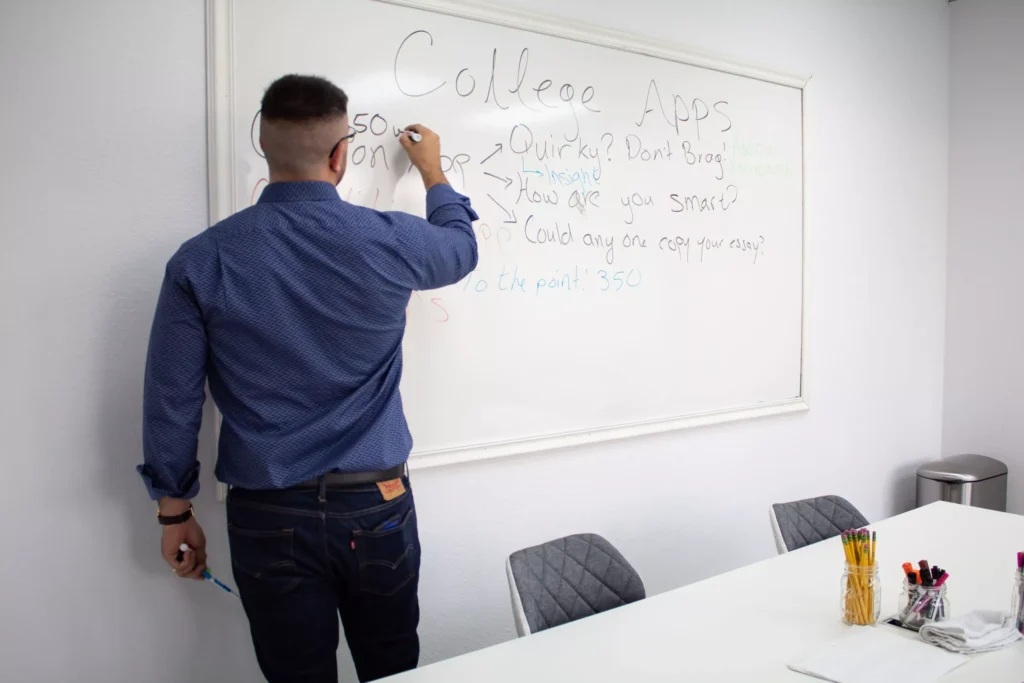
COLLEGE COUNSELING PACKAGE OPTIONS
- TIER 3: Targeting top 20-50 universities? Hoping to eventually getinto the top medical, law, business schools, or Fortune 500 companies thatIvy Leaguestudents get into? We ensure your child’s long goals are met through our college advising.
- TIER 2: . Tailored for the Top 10-20 National Universities. Includes everything from Tier 1 and additional items shown in the attached PDF and in the infographic.
- TIER 1: Aiming for Ivy League, Stanford, MIT, Top UCs? Unlock our acceptance algorithm and leverage our proven success to reach the academic pinnacle.
Expert Guidance
Find out more about our 5 Pillar College Counseling System Below
COLLEGE COUNSELING REVIEWS

Jasmin Sahota

Mara Hanck

Shreya Modak
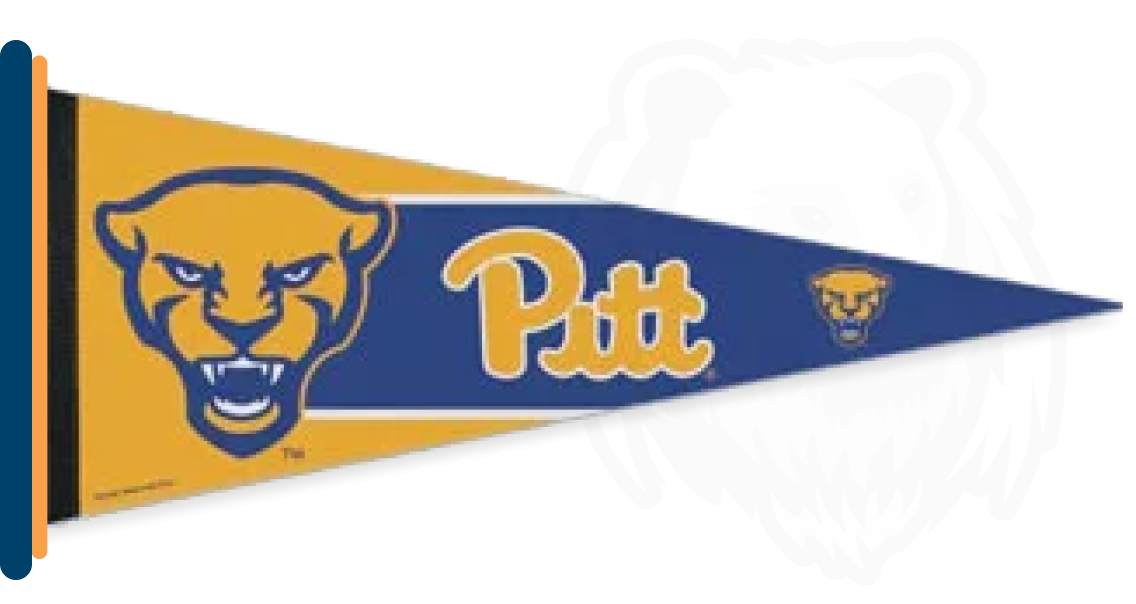
Cherry Marni
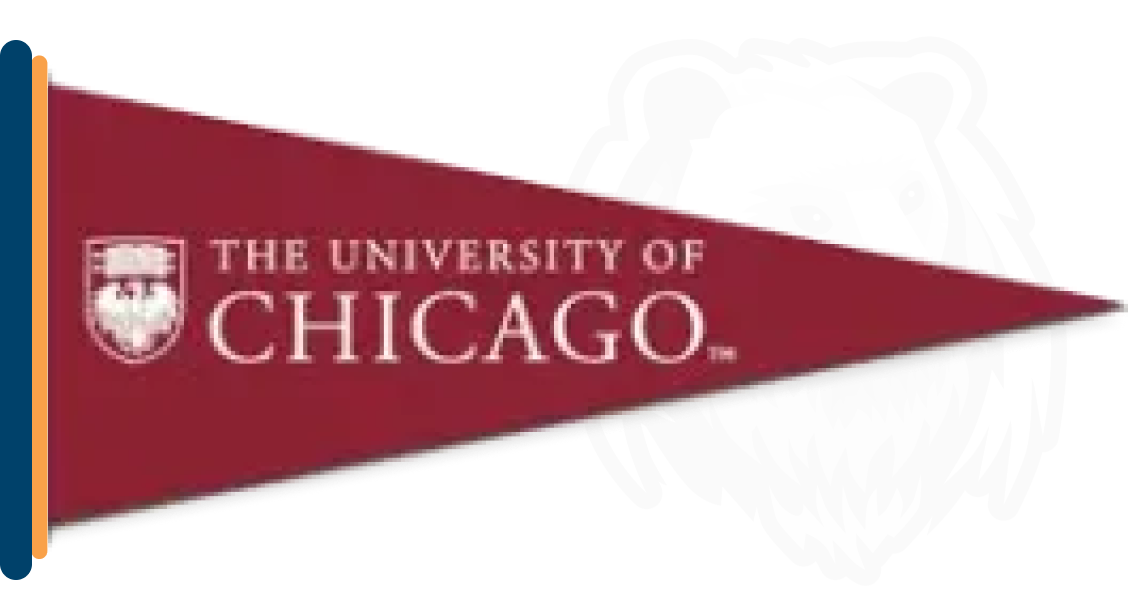
Aryo Garakani
5-Pillar College Counseling
The First Pillar is Academics
A combination of the right intra and extra curricular coursework, combined with an outstanding SAT/ACT score, alongside a few certification programs to ensure proficiency and academic experience.
The Second Pillar is Competitions
Participating in and achieving academic awards at the national and international level have now become standards for top university admissions. Schools like CalTech, MIT, and others are now requiring national competition scores. Coaching and guidance on competitions make all the difference in the college application process.
The Third Pillar is Professional Experience
Only a few of the thousands of internships carry any weight in the college admissions process. Don’t waste thousands, or even tens of thousands of dollars for internships that have no bearing. We have decades of experience on proper engagement with industry leaders at highly selective programs.
The Fourth Pillar is Community Engagement
Community service is out, Community Engagement is what is needed. We focus on helping students launch high impact initiatives that make a significant improvement to the most in-need with the community, while demonstrating soft skills across multiple cultures.
The Fifth Pillar is Personal Projects
Outside of the classroom, internship, job, or research, how has your participation in the field materialized. Universities need to see future entrepreneurs, leaders, and inventors. Personal projects and portfolio development provide students with a convincing argument that they belong in competitive universities and majors.
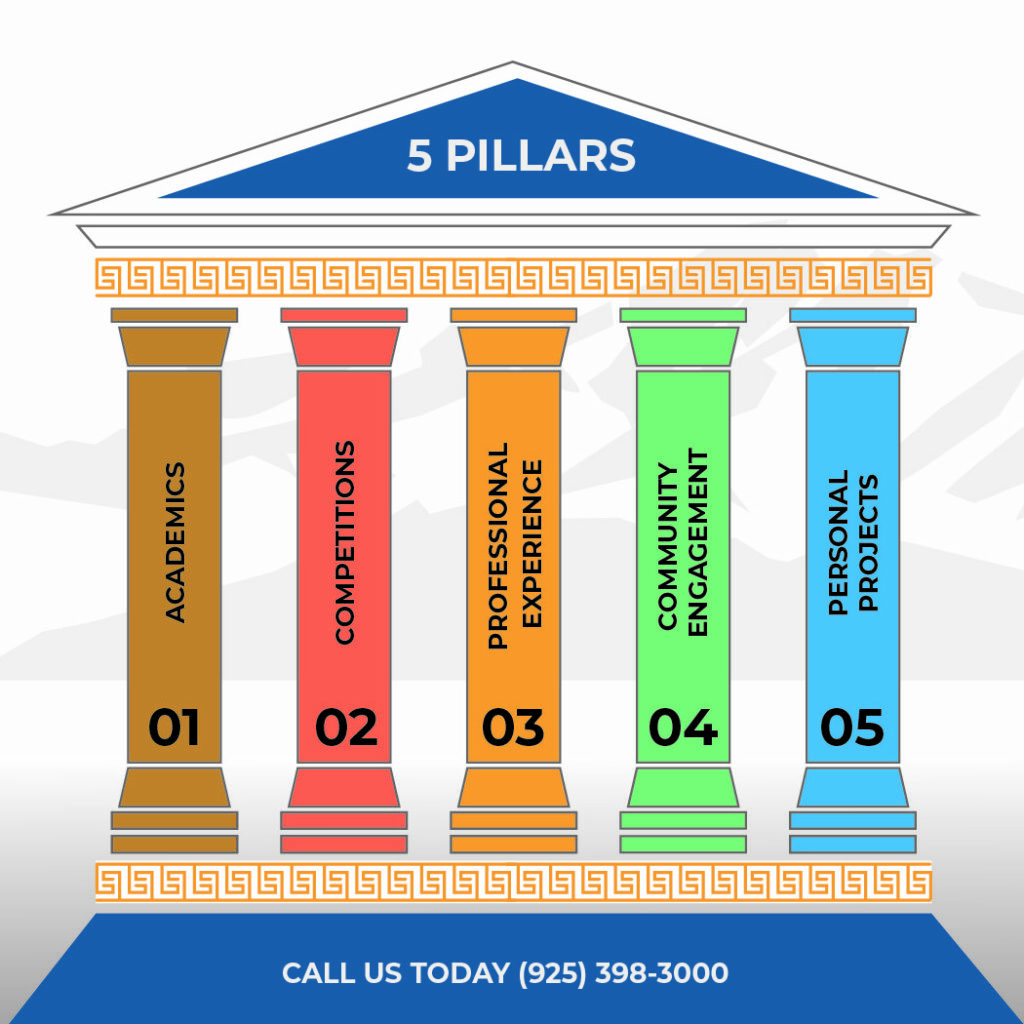
Counseling Includes:
- Academic Course Selection and Extracurricular Courses
- Applications for National & International Universities
- Volunteering
- Internships
- D1-D3 Athletic Advising
- Major Selections
- SAT/ACT Preparation
- Job Applications
- Scholarship Applications
- And Much, Much More!
Our combination of 5-Pillar College Counseling provides insider university knowledge through Development Days. This is how Olympus College Prep sends students to the colleges of their dreams.
Development Days Counseling
Olympus College Prep is unique in the college counseling space, as we provide Development Days! The goal is to familiarize our families with the expertise of the professionals. Development Days teach which colleges have the highest employability at Fortune 50 companies, how to connect with industry leaders, programs with high medical school matriculation rates, which universities lead to top MBA, Law, and PhD programs. We remove all the mystery and misinformation regarding the college process, basing our lectures on factual evidence provided directly from the admissions team of top universities. Furthermore, our development days also include several Study Skills Programs, to teach students how to time-manage, take notes, study effectively, memorize, speed-read, and take tests confidently and efficiently. Olympus College Prep trains students to be A+ academics.
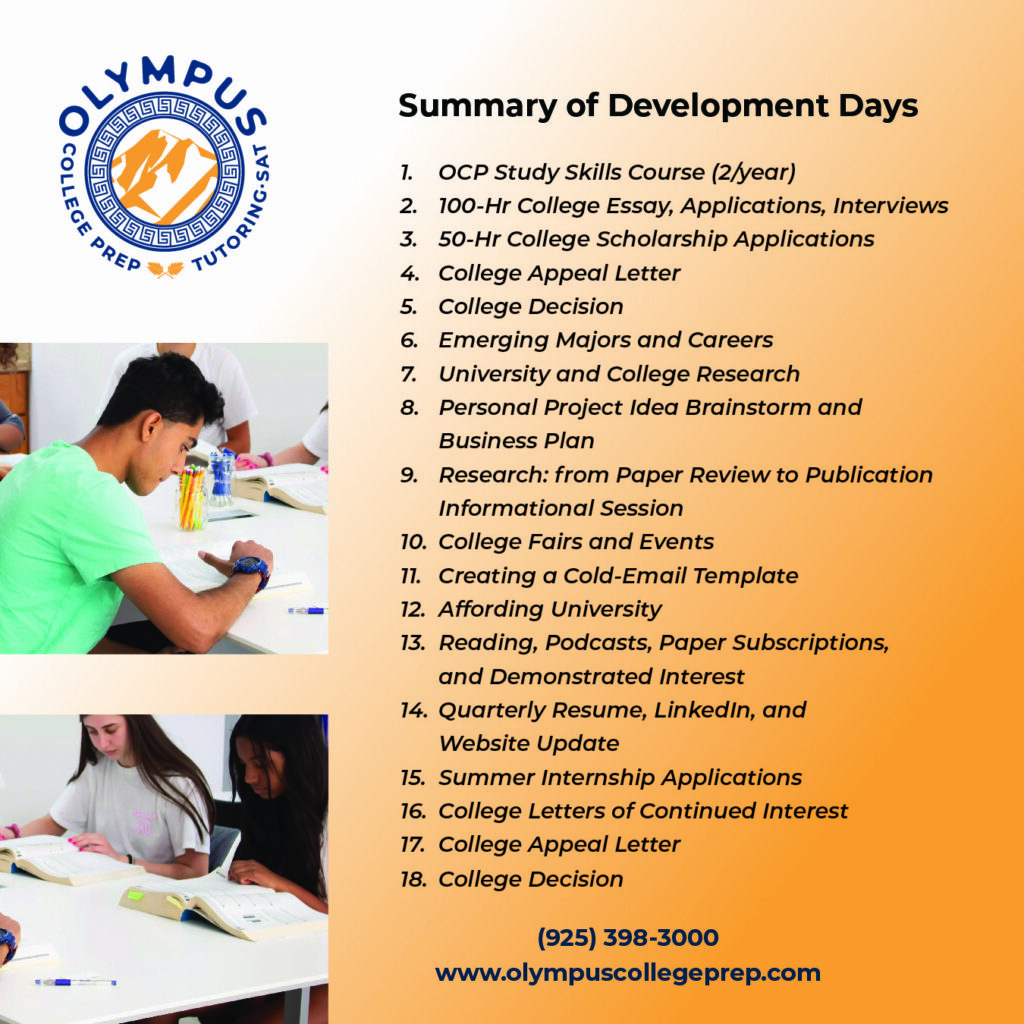
When Is the Best Time to Start College Counseling?
Deciding when to begin college counseling is crucial for shaping a student’s academic journey. Ideally, students should start as early as eighth grade. Why? Starting early allows students to receive guidance in several critical areas, ensuring a well-rounded and competitive profile by the time they apply to colleges.
Key Reasons to Begin Early:
Informed Course Selection: Early counseling helps students choose high school courses wisely. It ensures they meet prerequisites for their desired colleges and programs.
Extracurricular Activities: Counselors can guide students towards meaningful extracurricular activities, shaping their interests and experiences outside the classroom.
Skill Development: Starting early allows students to develop essential success skills, such as time management and effective study techniques. These skills are key for both academic and personal growth.
Internships and Job Shadows: Opportunities for internships or job shadows can be identified and pursued. This promotes real-world experience that often weighs heavily in college applications.
The earlier the start, the smoother and less stressful the journey can be. An early and structured approach to college preparation ensures that students don’t just meet requirements but also enjoy a well-rounded and fulfilling high school experience.
In sum, beginning college counseling by eighth grade offers a thoughtful, comprehensive approach that ultimately eases the college application process.
Who Can Benefit from College Counseling Services?
Navigating the path to higher education can be overwhelming. College counseling services offer invaluable guidance tailored to different age groups. Here’s how students at various levels can benefit:
Younger Students (8th & 9th Grade)
- Exploration: Discover potential career interests and understand future academic requirements.
- Foundation Building: Develop study habits and a solid academic base for high school success.
Middle High Schoolers (10th & 11th Grade)
- Course Selection: Assistance in choosing courses that align with college goals.
- Test Preparation: Strategies for standardized test-taking, including SAT and ACT.
- Extracurricular Guidance: Advice on selecting activities that enhance college applications.
Seniors & Transfer Students (12th Grade & Beyond)
- Application Strategies: Expert help in writing essays and completing applications for college admissions.
- Personalized Planning: Tailored plans for each student’s unique aspirations and academic profile.
- Transfer Support: Guidance for students looking to transfer to a new college.
Each stage presents unique challenges and opportunities. College counseling can make a significant difference by providing targeted support, ensuring students are well-prepared for the next steps in their educational journey.
How Counselors Elevate Personal Statements and Supplemental Essays
Crafting the perfect personal statement and supplemental essays can be daunting, but that’s where a skilled counselor steps in. These professionals specialize in guiding students through every stage of the writing process, ensuring that each essay showcases the applicant’s unique qualities and aspirations.
1. Personalized Story Development:
Counselors help students dig deep to unearth compelling personal stories that stand out. They guide students in identifying experiences and achievements that best highlight their strengths and individuality, transforming these into narratives that captivate readers.
2. Structuring for Impact:
With a keen eye for what colleges look for, counselors assist in structuring essays effectively. They ensure essays are coherent and logically organized, with strong introductions and conclusions that leave a lasting impression.
3. Polishing Language and Style:
Counselors work on refining the language, making sure it is polished yet authentic. They help eliminate unnecessary jargon and ensure the student’s voice shines through, making essays engaging and relatable.
4. Tailoring to Each College:
Supplemental essays often need to be tailored to each college’s unique prompts. Counselors provide insights on how to align responses with the college’s specific values and culture, enhancing the essay’s relevance and impact.
5. Constructive Feedback and Revisions:
One of the most crucial aspects of the counselor’s role is providing constructive feedback. They encourage multiple drafts and revisions, helping students develop their essays into the best possible version through continuous improvement cycles.
In summary, counselors play a pivotal role in transforming standard essays into exceptional ones that reflect a student’s true potential. Their expertise in storytelling and essay creation helps students not only meet but exceed application expectations.
How do college counselors support skill building for middle school students?
Counselors play a crucial role in nurturing essential skills for middle school students by offering personalized guidance tailored to each student’s needs and aspirations. Here’s how they do it:
1. Personalized Learning Plans
Counselors guide students in identifying their strengths and areas for improvement. They create customized learning plans that focus on building skills critical for high school success and beyond, such as time management, study strategies, and effective communication.
2. Workshops and Seminars
Through interactive workshops and seminars, counselors introduce students to various skills. These sessions can cover topics like critical thinking, problem-solving, and goal setting. By engaging students in activities, counselors ensure that learning is both practical and enjoyable.
3. Mentorship Programs
By pairing students with mentors, counselors provide them with role models who inspire and guide them. These mentors can offer real-world insights and advice, helping students to develop interpersonal and leadership skills.
4. Feedback and Reflection
Continuous feedback is vital in a student’s growth journey. Counselors regularly meet with students to review progress, offering constructive feedback. By encouraging self-reflection, counselors help students take ownership of their learning processes.
5. Parental Involvement
Counselors collaborate with parents to reinforce skill-building efforts at home. By keeping parents informed and involved, counselors ensure that students receive consistent support and encouragement.
By focusing on these areas, counselors effectively equip middle school students with the foundational skills they need to thrive academically and personally, setting them up for future success in their educational journey.
What Are Specialty Admissions, and How Can Counselors Help?
Specialty admissions refer to the unique and targeted pathways for students to gain entry into college programs that require specific skills, talents, or academic interests. These programs often include:
- STEM (Science, Technology, Engineering, and Mathematics) Programs: For students with a strong aptitude in science and math who wish to pursue a career in these fields.
- Business Schools: Catering to students with a keen interest in economics, finance, and entrepreneurship.
- BS/MD Programs: Accelerated tracks that combine undergraduate and medical school education for high-achieving students aiming for a career in medicine.
- Athletic Scholarships: Opportunities for students with exceptional athletic abilities to balance sports and academics.
How Counselors Can Assist with Specialty Admissions
Identifying Strengths and Interests: Counselors work closely with students to pinpoint their strengths, interests, and long-term career ambitions, guiding them toward appropriate specialty programs.
Tailoring Application Materials: They help personalize resumes, essays, and recommendation letters to highlight the specific achievements and skills that align with the specialty area.
Understanding Requirements: Counselors keep abreast of the specific requirements and nuanced application processes of specialty programs, ensuring students meet all criteria.
Preparation for Interviews and Auditions: For programs that require interviews, auditions, or portfolios, counselors provide essential training and feedback to refine presentation skills.
Exploration of Scholarships and Financial Aid: They assist in discovering scholarship opportunities specific to the specialty field, helping make education financially accessible.
By offering targeted guidance and support, counselors play a crucial role in navigating the complexities of specialty admissions, enhancing a student’s chance to secure a place in their desired program.
GET IN TOUCH
